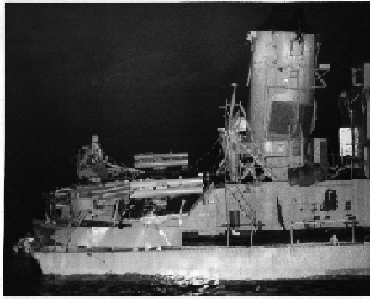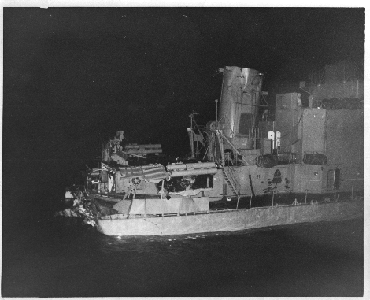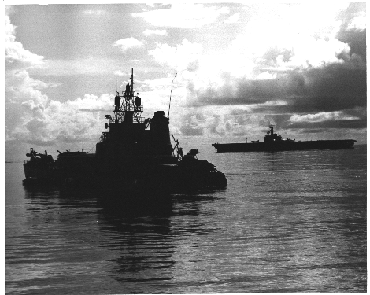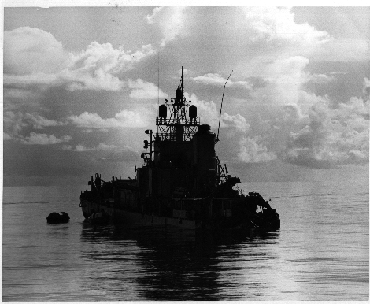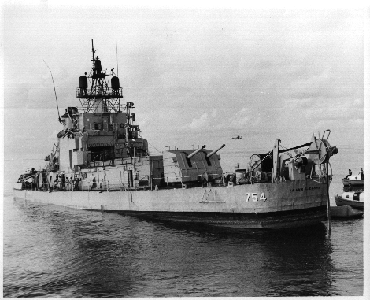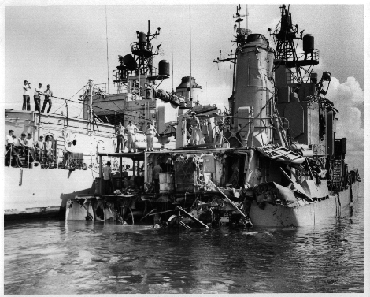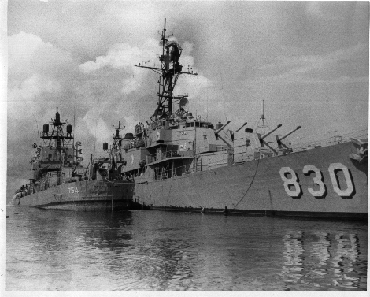Return to History Page
Salvage and Recovery Operations Aboard USS FRANK
E. EVANS (DD 754) on 3 June 1969
An Emergency Salvage and Recovery Team from the USS EVERETT
F. LARSON (DD 830) went aboard the slowly sinking after half of USS FRANK
E. EVANS shortly after 5 AM on 3 June 1969. Their orders were to survey
the damage and if possible to prevent the remaining half of the ship from
sinking to allow recovery of the valuable equipment and records on board.
Moving rapidly from compartment to compartment the team
found that damage in this half of. the ship was not severe behind the bulkheads
ripped out at the point of impact. They found slow, but steady, progressive
flooding which if not controlled would very shortly sink EVANS. Acting
quickly, the team rigged emergency pumps to drain flooding compartments
and at the same time began patching and plugging the numerous small leaks
which were causing the flooding.
The officer-in-charge of the team realized that removal
of the flooding water to keep the ship afloat was causing an even more
potentially dangerous situation-in-stability, that is; a tendency for EVANS
to capsize due to becoming top-heavy. Part of the team was put to work
removing topside weight. Within a matter of minutes about 5 tons of weight
was Jettisoned by cutting loose a large ventilation fan motor, a loading
machine used for training gun crews, a damaged boat davit, and the ships
motor whale boat (which was later recovered by personnel from USS JAMES
E. KYES (DD 787). A considerable amount of other smaller material was also
jettisoned. Since EVANS was only half a ship the salvage team had to rely
on estimates and "feel" to determine stability. Pumping was continued until
all intact compartments were dry and patches were installed for leaks below
the surface.
When it was established that the danger of sinking or
capsizing was past the USS LARSON came alongside and tied up to the EVANS.
Additional personnel were brought aboard EVANS to remove personnel records,
correspondence files, personal property and classified documents. Earlier,
the salvage team had located and removed the ship's diaries which would
positively establish who was on board at the time of the collision so that
all personnel could be accounted for. EVANS' supply officer came on board
and removed the ships' funds amounting to more than $100,000.
Meanwhile the Salvage team began cleaning up, eliminating
fire hazards and Other potential dangers. Weapons specialists had already
gone through the magazines checking all ammunition.
Towing hawsers were rigged and LARSON was prepared to
take EVANS in tow, if required. However, during the afternoon USS TAWASA
(ATF 96) an ocean-going tug especially rigged for towing came alongside
LARSON to take over salvage operations. In addition, salvage experts from
Subic Bay came aboard to insure that EVANS was ready for the long trip
to Subic Bay. These experts verified that the LARSON Salvage Team had done
an outstanding job of making EVANS watertight and ready for towing. At
6:l5PM 3 June 1969 the Commanding Officer of TAWASA took charge of EVANS
and LARSON departed the scene.
The LARSON Salvage and Recovery Team consisted of the
following:
Officer-in-Charge: Lieutenant James R. HOUGH, USN,
Chief Engineer
Damage Control Assistant : Lieutenant (Junior grade)
Frank S. WOODS
Senior Chief Machinists Mate Billy J. HICKS of Seattle,
Washington
Chief Ship Fitter Max E. SCHWALD of Long Beach, California
Chief Boiler Tender Harry N. ALEXANDER of Long Beach,
California
Machinist Mate first class James H. ELISON of Long
Beach, California
Machine Repairman first class Billy WOODRUFF of Oak
Harbor, Washington
Signalman third class Ron JONES
U.S.S. EVERETT F. LARSON (DD-830)
FLEET POST OFFICE
SAN FRANCISCO. CA 98601
South China Sea
June 4, 1969
To LARSON's families,
By the time you read this you will be aware of the fact that our destroyer
squadron suffered a tragic loss yesterday. Many of us lost personal friends
among the squadron members who did not survive the collision between HMAS
MELBOURNE and USS FRANK E. EVANS.
Some of you may wonder why we are out here conducting operations such
as Exercise "Sea Spirit". The basic purpose is to train together and develop
a capability among the SEATO navies to work together effectively to meet
possible threats to our mutual security. This is a worthwhile and necessary
objective. however, it must always be borne in mind that while the seaman's
profession is an honorable one it is inherently dangerous, even under the best of
circumstances. The sea is cruel and unforgiving of human frailty.
You should know that the rescue efforts within our task group were outstanding,
and undoubtedly contributed to keeping the number of casualties much lower
than might be expected in an accident of this sort. LARSON assisted by
putting men aboard to control flooding and repair damage, and thus to keep
the stern section of EVANS afloat. While this did not save any lives, it
enabled us to later go alongside EVANS in order to recover personal possessions
and valuables, as well as important records. I am proud to say that, to
a man, LARSON's crew carried out their duties in an exemplary way. You
have every right to be proud of the performance of your men on June 3rd.
Their actions were, of course, in accord with the best traditions of the
sea.
I know that you all share our sense of sorrow and loss. It is small
comfort to those families who have lost husbands, sons, or fathers, but
we should remember that those who died in EVANS did so in the service to
their country.
Very sincerely,
A. W. RILLING
Commander, U.S. Navy
Commanding Officer
P.S. The following message was received from Rear Admiral Jerome H.
KING, Jr., Commander Anti-submarine Warfare Group ONE just as this letter
was completed:
"YOUR SALVAGE EFFORTS ON AFTER END OF USS FRANK E. EVANS ON 3 JUNE WERE
PERFORMED IN AN OUTSTANDINGLY EFFECTIVE MANNER. THE SPEED, SPIRIT AND COMPETENCE
WITH WHICH LARSON RESPONDED TO THE DEMANDS OF THE OCCASION WERE INSPIRING.
MY CONGRATULATIONS AND SINCERE WELL DONE TO CAPTAIN AND ENTIRE SHIP'S COMPANY."
My thought is that a comment such as this is always dependent upon the
entire crew (that is, the "skip's company") and supports what I wrote above.
It should be a source of individual pride to each of you.
The Following Photos are courtesy of Lionel Cahill
Go to Top of Page
